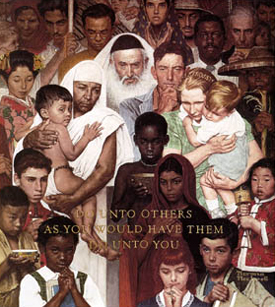
The Golden Rulealso known as Do Unto Others

|
The Golden Rule (also known as Do Unto Others) was a Saturday Evening Post cover for April 1, 1961, much like Rockwell's other famous works. It differs sharply, however, from the bulk of his oeuvre, in one fundamental aspect: it lacks a sense of narrative. Rockwell, perpetually in danger of being too sentimental, has done just that here, but that is not to say the painting is without merit.
Do Unto Others followed a painting of the United Nations that Rockwell never finished. That painting has the same mass-of-people effect, but with several UN ambassadors in the foreground. It also belongs to a group of paintings Rockwell made during the same period of time, including works about the Peace Corps, the War on Poverty, the Apollo 11 team, and others: all were overly sentimental, all lacked his renowned story-telling aspect. Many critics reviled this shift to the non-narrative, but Rockwell's technical precision did not suffer because of it.
Do Unto Others is an attempt by Rockwell to make a universal statement about humanity. In that he ultimately failed. What the painting can now be treasured for though, is that it is essentially a panorama of his people. Rockwell always excelled at painting people in a flattering light, while still exposing their idiosyncrasies and foibles. Here, he is able to depict a wide cross-section of humanity we can identify with, even though they lack the concrete activity of his other works. Most were modeled on people who lived in and around Stockbridge, Massachusetts, where Rockwell lived: a Japanese student from nearby Bennington College; a Chinese girl from Pittsfield; a Brazilian boy from Stockbridge, etc. The woman in green is his wife, Mary, holding her grandson, who was actually born mere weeks after she died. She was not able to hold the baby while alive, but Rockwell let her do so posthumously as best he could.












